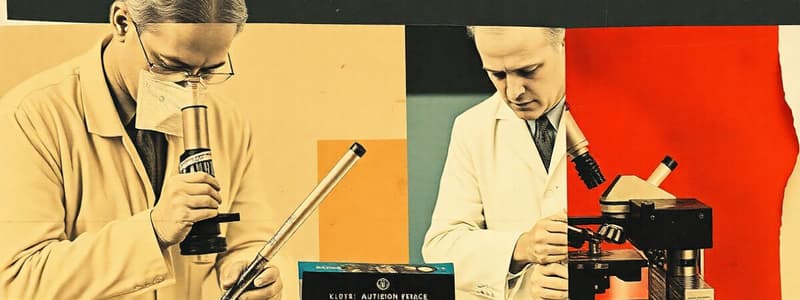Podcast
Questions and Answers
What is the MOST appropriate method for sterilizing reusable materials that have come into contact with high-risk biological samples?
What is the MOST appropriate method for sterilizing reusable materials that have come into contact with high-risk biological samples?
- Washing with water
- Sterilization via autoclave (correct)
- Washing with soap and water
When handling heated glassware in the laboratory, which tool is MOST suitable for safely holding and removing it from heat?
When handling heated glassware in the laboratory, which tool is MOST suitable for safely holding and removing it from heat?
- Latex Gloves
- Metal tongs (correct)
- Wooden tongs
How should materials used to contain biological samples be categorized in terms of risk?
How should materials used to contain biological samples be categorized in terms of risk?
- High risk (correct)
- Low risk
- Medium risk
What is the MOST important characteristic of materials used for collecting samples for microbiological analysis?
What is the MOST important characteristic of materials used for collecting samples for microbiological analysis?
Which type of solvent is BEST suited for cleaning reusable laboratory equipment contaminated with lipophilic residues?
Which type of solvent is BEST suited for cleaning reusable laboratory equipment contaminated with lipophilic residues?
Which apparatus is specifically designed and used for microscopic counting of particles?
Which apparatus is specifically designed and used for microscopic counting of particles?
What is a PRIMARY application of Petri dishes in a laboratory setting?
What is a PRIMARY application of Petri dishes in a laboratory setting?
Where should sample incubations be performed to maintain a stable and optimal temperature?
Where should sample incubations be performed to maintain a stable and optimal temperature?
What is a necessary pre-treatment step for materials before using them to take microbiological samples?
What is a necessary pre-treatment step for materials before using them to take microbiological samples?
For direct microscopic examination of biological specimens without prior staining, which technique is MOST appropriate?
For direct microscopic examination of biological specimens without prior staining, which technique is MOST appropriate?
Flashcards
What does sterilization achieve?
What does sterilization achieve?
Sterilization eliminates all forms of microbial life, including spores.
Re-usable material with high risk biological sample contact?
Re-usable material with high risk biological sample contact?
The material should undergo sterilization in an autoclave to ensure complete elimination of any potential pathogens.
What are Petri dishes used for?
What are Petri dishes used for?
Petri dishes are used for microorganism cultivation, cell culture, and other research where a controlled environment is needed
What is incubation?
What is incubation?
Signup and view all the flashcards
Material for samples?
Material for samples?
Signup and view all the flashcards
Microscopic observation - en fresco?
Microscopic observation - en fresco?
Signup and view all the flashcards
Microscopes - optical part?
Microscopes - optical part?
Signup and view all the flashcards
What is 'la platina'?
What is 'la platina'?
Signup and view all the flashcards
Preparing culture media, what pH?
Preparing culture media, what pH?
Signup and view all the flashcards
What is the purpose of sterilization?
What is the purpose of sterilization?
Signup and view all the flashcards
Study Notes
- The following are study notes for a laboratory assistant exam, focusing on specific knowledge regarding laboratory procedures, equipment, and safety.
Handling and Sterilization of Materials
- Reusable material in contact with high-risk biological samples must be sterilized in an autoclave.
- Metal tongs should be used to hold glassware when removing it from heat.
- Material intended to contain biological samples is considered to be of high risk.
- Material for collecting samples for microbiological analysis must be sterile.
- Reusable laboratory material with lipophilic residues should be cleaned with organic solvents.
- For microscopic particle counting, a counting chamber is required.
- Petri dishes are used for preserving samples.
- Sample incubation should be done in an incubator, not a refrigerator or autoclave.
- Materials used for taking microbiological samples must be sterilized beforehand.
Microscopy
- Microscopic observation of "fresh" samples should be performed with unstained samples.
- The optical part of microscopes consists of two converging lenses.
- Auramine is used in fluorescence microscopy.
- The microscope stage (platina) is used to hold the preparation being observed.
Culture Media
- Dehydrated culture media should be stored at a temperature between +15 and +26 °C.
- Distilled water with a near-neutral pH should be used in the preparation of culture media.
- The clarity of culture media is a physicochemical parameter.
- Culture media are mixtures of substances used for the growth and multiplication of bacteria.
Laboratory Procedures and Responsibilities
- Sample preparation in the laboratory should be performed by a laboratory assistant.
- Cleaning and maintaining laboratory equipment is one of the specific functions of a laboratory assistant.
- Preparing reagents and culture media are among the duties of a lab assistant.
Safety Practices
- A lab coat should always be worn when handling biological samples during the workday.
- Manipulation of microbiology samples should be carried out in laminar flow cabinets.
- Used, sharp disposable materials should be discarded in designated sharps containers.
- Flammable reagents must be handled in fume hoods.
- Radioactive isotopes produce gamma rays.
Sterilization and Disinfection
- Ethylene oxide is a high-level germicide.
- Sterilization is a procedure used to eliminate microorganisms, including resistant forms like spores.
- Aldehydes and ethylene oxide are chemical agents used as disinfectants and/or sterilizers.
- The Pasteur oven uses dry heat for sterilization.
Studying That Suits You
Use AI to generate personalized quizzes and flashcards to suit your learning preferences.
Related Documents
Description
Study notes on laboratory procedures for handling and sterilizing materials, microscopy, and necessary equipment. Focus on sterilization methods, microscopy techniques, and safe handling of biological samples. Includes best practices for cleaning and maintaining lab equipment.



